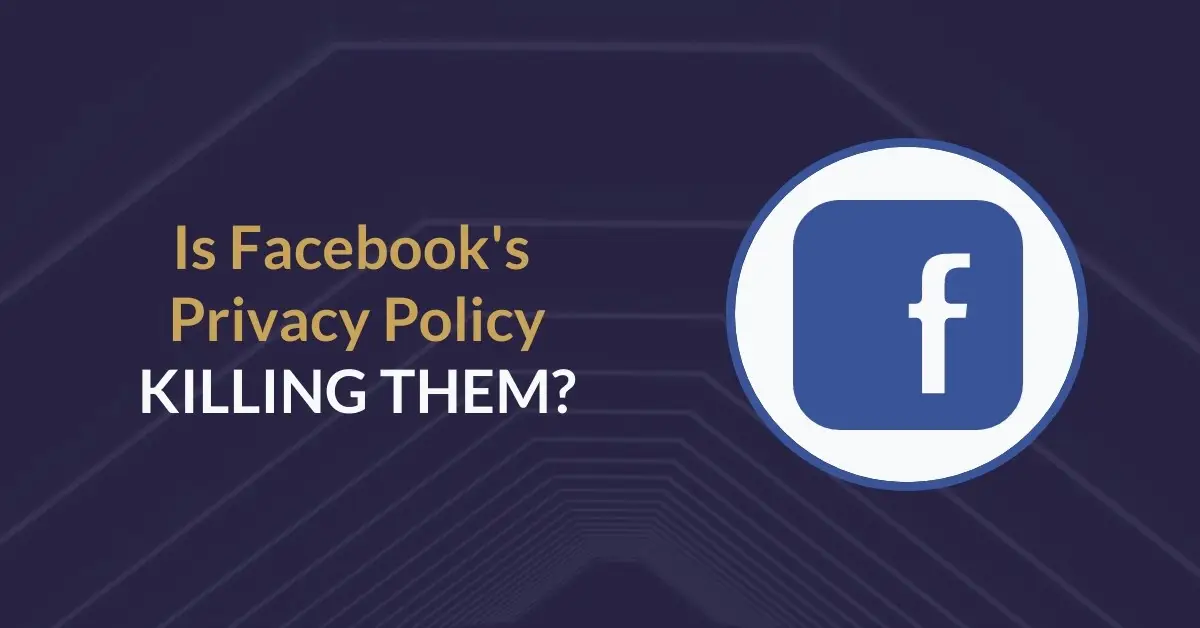Is Facebook’s Privacy Policy Killing Them?


May 2022 update: An internal document leaked in April seems to indicate that Facebook truly has no idea what happens to collected user data, or where it goes, and claims to have little to no control over this. This certainly can’t help Facebook’s reputation.
On January 27, Facebook made stock market history—but not in a good way. Facebook’s stock dropped by 26%, losing a quarter of a trillion dollars and setting the record for the largest stock drop in a US company ever recorded. The social media giant also lost approximately a million users. This incident goes far beyond typical stock market fluctuations. This destroyed over a quarter of Facebook’s value in a day.
Why did this happen? These four key points heavily indicate that Facebook’s stock disaster is directly caused by privacy failures:
- Existing lack of investor trust
- Lack of respect for user privacy
- Apple’s new iPhone feature that forced Facebook privacy transparency
- Facebook’s determination to “double down” on disrespecting consumer privacy
A very strong case can be made that Facebook’s privacy record (or lack thereof) contributed heavily to their 26% collapse.
Investors Turn Their Backs on Facebook
It’s likely Facebook’s investor base was already concerned about the trustworthiness of the company. Part of this could be due to investors actually being users of Facebook themselves, but it also could be due to a few egregious headline-making privacy violations.
One drastic example occurred in 2018 when Cambridge Analytica acquired private data from tens of millions of Facebook users to create voter profiles for upcoming elections. The New York Times called this incident “the largest known leak in Facebook history”, a somber reminder that as bad as this incident was, it’s also the worst incident that we know about. Investors may wonder, “What incidents do we not know about?”
Poor Facebook Privacy Management Exposed for the World to See
Understandably upset by the Cambridge Analytica leak and plenty of other incidents, Facebook users began to lose faith in the company. Users no longer trusted that Facebook would protect their data, and became concerned that far more data than was acceptable was going into Facebook’s records. Meanwhile, Facebook only continued to develop more and more ways to collect user information, not to mention selling uncomfortable amounts of data to feed what Bloomberg calls their “ad addiction”. Finally, this lack of consumer faith culminated in last month’s mass exodus of approximately one million users.
A few recent actions from Apple have also highlighted Facebook’s reckless behavior. With the latest iPhone model came the App Privacy Report feature, which allows users to see what permissions their mobile apps have and which permissions are regularly used. They can then easily disable permissions that they neither want nor need from any of their downloaded apps. Facebook users with iPhones thus have a very clear picture of what Facebook is doing on their phones—and they don’t like what they see.
As the current largest company in the world, Apple’s influence can hardly be understated. By implementing a feature that places data control directly into consumers’ hands, Apple has set the bar for customer privacy and data protection quite high. Facebook could have beaten Apple to the punch by working on its own transparency first. But instead of being proactive, Facebook stalled until the new iPhone and general public opinion forced them to be more honest.
Facebook Doubles Down on Bad Behavior
With a growing lack of trust in privacy policies, it seems like the best thing for Facebook to do would be to make some significant changes. But the company instead appears to be doubling down. The two most recent examples come from conflicts in Europe and Australia.
Frustrated with European privacy concerns over data transferred to US-based organizations, Facebook’s parent company Meta recently threatened to remove both Facebook and Instagram from Europe altogether. In a surprising response, European privacy regulators happily invited them to do so. German Economy Minister Robert Habeck explained he hasn’t used Facebook at all since his account was hacked four years ago, and French Finance Minister Bruno Le Maire even stated that “we would live very well without Facebook”.
Australia has also pushed back against Facebook privacy antics. Following the Cambridge Analytica scandal, Australian privacy authorities discovered that Facebook was collecting and processing data on Australian citizens during the same time frame and pursued legal actions. Instead of acknowledging their mistake, Facebook claimed that they weren’t technically conducting business in Australia since none of the data was collected or processed physically in Australia itself. Australian judges recently struck down this argument and allowed the lawsuit to move forward. As of this blog, the case is still ongoing.
Facebook Still Wants to Collect More Private Data
Instead of truly responding to the public’s demands for greater respect of their privacy, year after year Facebook has doubled down on privacy invasion by introducing even more intrusive technologies. This has only become more obvious with recent activities like face capture technology and poor data handling in the Metaverse. Facebook has consistently failed to learn from their mistakes. And with a long track record of privacy issues dating back multiple years, it’s unlikely they’ll start learning now.
How Your Company Can Avoid Facebook’s Self-Made Dilemma
Facebook’s recent downfall shows that even if users choose not to complain about certain practices, they will vote with their feet—and their wallets. How many customers have you lost? How many people might be unhappy with your privacy policies, but are simply withdrawing their business instead of telling you? What can you do to retain a happy customer base?
Facebook may not be learning from their mistakes, but you certainly can. Step up your privacy game today with 4Comply, a software that automates privacy compliance and allows you to manage customer data preferences with just a few clicks. Get in touch with us today to learn more.





